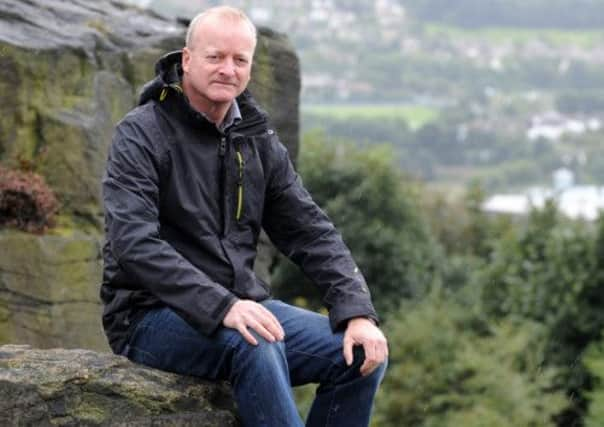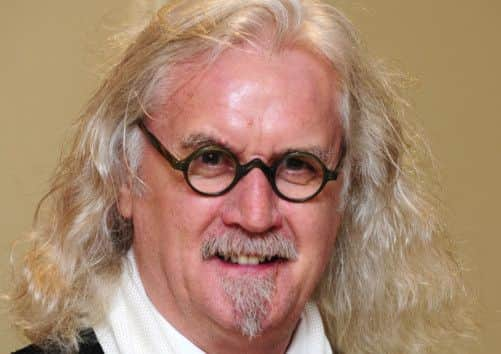Why I’m determined to think positive as I face life with Parkinson’s disease


When news broke this week that Billy Connolly is being treated for the early stages of Parkinson’s disease you could almost hear the sharp intake of breath as the obituary writers sharpened their nibs. The fact he had also undergone surgery for prostate cancer was bad enough, but it was the mention of Parkinson’s which really punctured the image of the larger than life comic
Partly it was because the tremor and loss of memory so associated with the condition seemed a particularly cruel blow for a man whose career has been made on sharp wit and verbal dexterity and it was hard not to view the assurances from the Big Yin’s spokesman that it will not affect his ability to work as anything more than an exercise in positive thinking.
Advertisement
Hide AdAdvertisement
Hide AdJohn Sheffield, who was diagnosed with the condition almost four years ago knows only too well the myths and misconceptions which surround the disease. Often associated with the elderly and infirm, John, from Bingley, was just 52 years old when a series of tests confirmed doctors’ suspicions.


“I’ve always been fit and healthy then one day I went to buy a sandwich and when I went to walk out of the shop I couldn’t move my left leg,” he says. “I knew something wasn’t right, but it never occurred to me that it could be Parkinson’s. There’s no history of the condition in my family, but I guess sometimes there is no rhyme and reason to why these things happen.”
A born optimist, John was determined that Parkinson’s wasn’t going to force him to press the pause button. Having talked to his wife Andrea and daughter Amy, who is currently studying at Sheffield University, he very quickly decided to be honest about his condition and not shy away from doing any of things he had enjoyed before diagnosis.
“I know a lot of people think of it as an old person’s disease and when you’re diagnosed at a relatively young age I can see why people want to keep it a secret for fear that they will be written off,” says John. “That’s never been my approach. Right from the start I was determined to be open with people and I have to say that everyone has been incredibly supportive.
Advertisement
Hide AdAdvertisement
Hide Ad“Say the word Parkinson’s and it has so many awful connotations, but I never had that period that so many people go through when I was angry or bitter. In fact it was more worrying before I had a diagnosis. You inevitably imagine the worst case scenario, so when I was told it was Parkinson’s I thought, ‘Right, I can deal with that, let’s get on with it’.”
While John has the odd problem with his balance, occasionally suffers from tiredness and did go on to develop a slight tremor in one arm, it’s nothing he can’t deal with. Treatment for Parkinson’s, which in the vast majority of cases relies on medication, can be a case of trial and error, but the daily dose of tablets – four in the morning and three throughout the rest of the day – he’s now prescribed keeps the worst of the symptoms at bay.
The progress of the condition varies from one person to the next, but aside from the six-monthly check-ups and an appointment every three years to retake his driving test, Parkinson’s hasn’t yet intruded too much on day to day life.
“It’s something which is always there, but I try to ignore it as much as possible, we even went skiing in February,” he says. “There was one day when I found I just couldn’t turn left. Now clearly that’s not ideal when you’re on the slopes, but if that’s the worst thing that’s happened then I consider myself pretty lucky. I am a great believer that if you can maintain a positive attitude then it does prevent you from succumbing to the symptoms.”
Advertisement
Hide AdAdvertisement
Hide AdThe diagnosis did, however, force John to reassess his priorities. He left his job as a director of an electrical company, but, determined to continue working, he set up his own consultancy business. He’s also rediscovered a childhood love of art.
“I used to really enjoy drawing when I was a pupil at Pudsey Grammar School, but I hadn’t picked up a pencil since I left,” he says. “Then about a year ago, I thought I’d give it a go again. Over the last few months I’ve completed a series of sketches from York Minster to the Houses of Parliament. I find that to concentrate on fine details actually helps the symptoms.
“I’ve also started to experiment with watercolours, but let’s just say that’s a bit of a work in progress.”
Twelve of John’s sketches will form a charity calendar being sold through Facebook with proceeds going to Parkinson’s UK. The organisation operates across the country both funding research into the condition and supporting those who have been diagnosed with the disease.
Advertisement
Hide AdAdvertisement
Hide AdCurrently there is no cure for Parkinson’s and scientists have so far been unable to pinpoint why people develop the condition which occurs due to a loss of nerve cells in the brain.
These cells produce the chemical dopamine, which is vital in allowing messages to be sent to the part of the brain responsible for co-ordinating movement. The problem is that by the time the first signs of Parkinson’s disease are presented, around 70 per cent of these cells have already been lost.
Current thinking suggests that people develop the condition due to a combination of genes and environmental factors. There is some evidence that toxins may affect the brain cells and there has been much speculation about the link between the use of herbicides and pesticides and the development of Parkinson’s.
The jury is still out and while a wealth of research is already under way, for now much of the work of Parkinson’s UK is concentrated on making life as comfortable and as easy as possible for those with the condition.
Advertisement
Hide AdAdvertisement
Hide AdThere are around 127,000 people in Britain with Parkinson’s and the rate of diagnosis stands at one an hour. Like John, most learn to adapt to the condition, but for those with the most severe symptoms, specialist nursing care is vital.
“In this region we do have a good coverage of nurses, but we could always do with more, particularly in the rural part of the county,” says Tracy Westgarth, Parkinson’s UK regional manager for Yorkshire and the Humber. “The guidelines issued by the National Institute of Clinical Excellence recommend that each community nurse should have no more than 300 patients on their books. In North Yorkshire we have three nurses, but 1,300 people who are suffering from Parkinson’s and in Leeds we have two nurses, but 1,500 patients. Now of course the majority of those don’t need to be seen every week or even every month, but demand is increasing and will continue to do so as the population ages.”
Parkinson’s UK currently has 22 community nurses operating in the region with a further five due to come on board shortly. The charity is committed to paying their salary for the first two years and are also committed to giving sufferers access to decent physiotherapy and emotional support.
“Because balance becomes a problem a lot of Parkinson’s sufferers find themselves admitted to hospital following a fall,” adds Tracy. “Often they end up on an orthopaedic rather than neurological ward and that’s fine, but we need to make those nurses aware of those other needs. The timing of medication is crucial to the treatment of the condition, but often in a busy department where resources are stretched those regular routines can slip.”
Advertisement
Hide AdAdvertisement
Hide AdThe diagnosis of high profile figures like Connolly, Bob Hoskins and Michael J Fox, gives charities like Parkinson’s UK, a window of opportunity to raise awareness of the condition and the symptoms which range from the familiar tremors to insomnia and slurred speech.
“Going to support groups is not for everyone who has Parkinson’s and a lot of people resist going because they don’t want to see someone who is worse than them,” says Tracy. “It’s all tied up with the fear of the future, they don’t want to be faced with what they might end up like. That’s entirely understandable, but so many people have told me that when they did finally take part they wished they had done it sooner.”
John remains refreshingly pragmatic about what lies ahead.
“Yes, some people slur their words and yes, occasionally we all dribble a bit, but life doesn’t or at least it shouldn’t stop. There are side-effects, some people become addicted to gambling or sex, but me? I’ve just got jumpy arms and legs. I’m pretty much the same John as I was before.”
Search goes on for a cure
Advertisement
Hide AdAdvertisement
Hide AdThe disease was identified by – and named after – Dr James Parkinson who wrote An Essay On The Shaking Palsy in 1817.
“I think James Parkinson would marvel at the progress which has been made in diagnosing, understanding and treating the condition that now bears his name,” says Parkinson’s UK researcher Dr Patrick Lewis. “But I am sure he’d be surprised and disappointed to discover that, almost two centuries.we are yet to find a cure for this devastating condition.”
Parkinson’s UK runs a confidential free helpline on 0808 800 0303. To find out more go to www.parkinsons.org.uk.
To order a calendar, search for ‘Parkinson’s UK calendar 2014’ on Facebook.